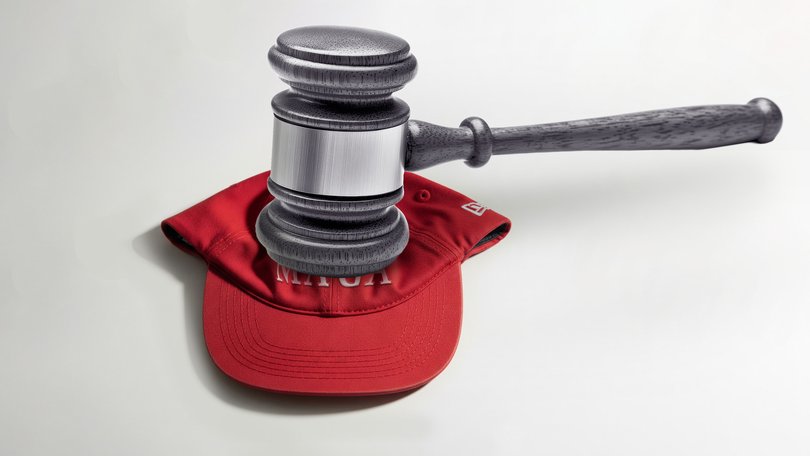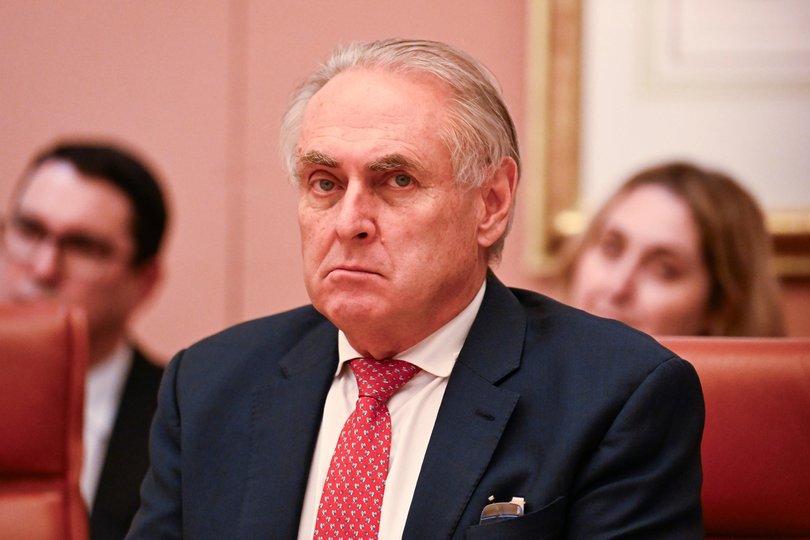Trump tariff slapdown: How US Court of International Trade put Trump’s levy war on hold
The US Court of International Trade’s move to block Donald Trump’s tariffs will spark all-out lawfare. To use an American expression, Australians should be rooting for the judiciary.

In a stinging rebuke to Donald Trump’s economic agenda, the US Court of International Trade has ruled that the President exceeded his authority in using emergency powers to impose sweeping tariffs on American trading partners. It marks the first decisive blow for Democrats since Trump took office.
The ruling, related to cases brought by 12 Democratic states and a group of small businesses, strikes at the heart of Trump’s tariff architecture, invalidating the legal basis for his global flat tariff, elevated rates on China, and a raft of newer tariffs aimed at fentanyl supply chains that affected China, Canada and Mexico. However, it does not touch tariffs imposed under separate authorities, including the 25 per cent tariff on steel and aluminium or the tariffs on goods like automobiles, which remain in place.
Make no mistake, there will be all-out lawfare over this case, with Trump’s deputy chief of staff, Stephen Miller, taking to X to say the “judicial coup is out of control.”
Sign up to The Nightly's newsletters.
Get the first look at the digital newspaper, curated daily stories and breaking headlines delivered to your inbox.
By continuing you agree to our Terms and Privacy Policy.To use an American expression, Australians should be rooting for the judiciary.
Trump’s tariff policy is one of the most boneheaded and mismanaged economic initiatives in history, one that not only punishes allies while potentially rewarding its stated enemies, but also completely misunderstands the basic tenets of trade.
In its act of economic self-harm, the administration has shown it is a bad-faith negotiator, has been craven in its backdown against the tariffs’ main target — China — and was unprepared for its implementation.
Following Liberation Day, economists concluded that rushed Trump staffers used ChatGPT to calculate a crude algorithm for tariffs based on the flow of goods, one that made no account for the value that trade created for the US. A similar “dog ate my homework” effort seems to have been used by the administration to cobble together a legal rationale for its tariffs. A cursory review of the plaintiffs’ argument by even the most unqualified reader of the law would suggest this case was open and shut.
A separate case brought by the State of California lays out in simple terms how the Trump administration cherry-picked the words “regulate” and “importation” from paragraphs apart in the International Emergency Economic Powers Act of 1977 (IEEPA), conjoined them with an ellipsis, and used that as justification for its actions.
“Nothing in IEEPA allows for so tremendous and unheralded a power, representing such a transformative expansion in presidential authority with such a vast economic and political significance as this would be, through so wafer-thin \[a] reed as the lone, cherry-picked word ‘regulate’,” the case asserts.
Ruling on the other cases, the Court took a similar view: “An unlimited delegation of tariff authority would constitute an improper abdication of legislative power to another branch of government,” it wrote in handing down its verdict.
This will be appealed by the Trump administration and will likely find its way to the Supreme Court, which has a conservative super-majority. So far, it has overturned a number of precedents in favour of Trump’s policies, but it has also begun to push back, including with judgments that suggest it will defend the independence of the US Federal Reserve.
For now, the ruling blows a hole in the reciprocal tariff negotiations between the US administration and the rest of the world, including Australia.
Trade Minister Don Farrell, using the most diplomatic language possible, said the government would “study this ruling.”
“The Albanese Government has been consistent in the view that these tariffs on Australian imports into the US are unjustified.
“We will continue to engage and strongly advocate for the removal of tariffs,” Mr Farrell said in a statement.

Behind the scenes, according to Dr Jenny Gordon, a former chief economist at the Department of Foreign Affairs and Trade and non-resident fellow at the Lowy Institute, DFAT officials will be working furiously through their international relationships to shore up global resistance to tariffs.
“We’ll talking to Japan, to Korea, trying to find mechanisms that help maintain as much of the rules-based order as we can, in the face of what was starting to look like a pretty nasty US–China trade war,” Dr Gordon said.
If the Trump administration can’t successfully appeal the ruling, its tariff plan would need to be legislated by Congress.
There is no guarantee that would be an easy process, said Huw McKay, former chief economist for BHP and now a fellow at the Crawford Centre at the Australian National University.
Last week, the US House narrowly passed what Trump calls his “Big, Beautiful Bill,” featuring multi-trillion dollar tax cuts and increased defence spending.
With Republicans holding the House by five seats and the Senate by six, it would take only a few defections to block any move to hand Trump sweeping tariff powers. And with all 435 House seats and 33 Senate seats up for re-election in 2026, the longer this remains tied up in court, the more pressure lawmakers will feel to assert control.
The US economy is already seeing a sharp decline in growth due to tariff uncertainty. Combined with other failed initiatives — such as DOGE, the proposed slashing of social benefits, or overreach in attacking universities — voter dissatisfaction is likely to grow.
If the Trump administration loses its appeal and has to go to Congress for tariff powers, even then it will take time.
“If they try and do a massive omnibus bill with every country in the world getting a new tariff rate, every congressman is going to put their pet project in there, and that’s what will take time,” Mr McKay said.
“It really puts a spanner in the works of the negotiating model.”
Australia, Mr McKay said, should “sit tight and wait for America to come to us,” given it is one of the less-tariffed countries.
“I don’t think our experience trying to negotiate an exemption from the steel and aluminium tariffs should give us confidence that we’re entering into a good-faith negotiation on the flat 10 per cent tariff,” he said.
While Kevin Rudd was expected to be building coalitions in Congress, that work must now also support the global trading system.
“Australia has a lot of goodwill inside the United States, but I’m not sure this is about one country getting an advantage over other countries in terms of their position with the US. If we got zero tariffs and everyone else had a horrendous situation, that wouldn’t work for us. We need a system where we’re as close as possible to the world before Liberation Day — actually, before Inauguration Day,” Mr McKay said.
Dr Gordon said that united front was critical, given how the threat of reciprocal tariffs had been used so far.
“What’s really scary is this idea of the US picking off countries one by one with a long list of demands that their big corporations don’t like,” she said.
“This court ruling gives backbone to countries to stand up in those negotiations, and not give away things that are really important to them, like our pharmaceutical benefits scheme.”
US share market futures leapt on the news, but don’t get too excited yet.
As one leading asset manager told The Nightly, this just adds more uncertainty to the stop-start turmoil that has surrounded tariffs since they were first introduced.
And there may be a bigger sting in the tail. Trump’s Big Beautiful Bill was relying on tariff revenue to pay for those tax cuts. The bond market has already been in convulsions over the growing US deficit, and as a result, long-term interest rates have been rising worldwide. This will only make them more nervous.

